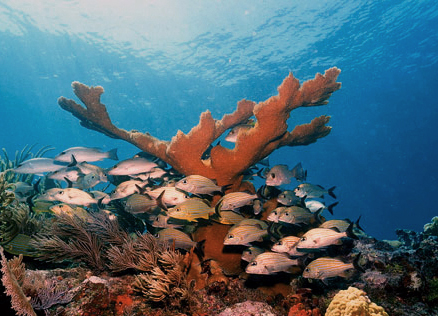
With the recent release of Chasing Coral on Netflix, coral reefs have never been such a hot button topic. Watching the coral bleaching events they recorded on the Great Barrier Reef and the rapid degradation of fish life in that ecosystem is heartbreaking. This documentary is informative as it shows the viewer the rapid changes that reefs are undergoing, but it focuses in only one area of the world. So what about the reefs of the Florida Keys?
In recent history, coral reefs have been faced with large scale bleaching due to warmer water temperatures and ocean acidification. In Chasing Coral you are shown a rapid bleaching event, but it doesn’t always happen that quickly. Here at Sea Dwellers Dive Center in the Keys, we have faced a few bleaching events and the reefs are not thriving as they once were even five years ago. The reefs are still abundant with marine life and are gorgeous to dive, but there has been several bleaching events over the last 10 - 20 years that are taking a toll. Here is more information regarding climate change. The reefs are certainly changing and here is what each of us can do to help fight Global warming!
Things you can do to help reduce your footprint and stave off climate change to help our Reefs in Key Largo survive;
- Buy a reusable water bottle! Plastics are one of the main marine pollutants and are responsible for killing many marine organisms every year.
- Use reusable grocery bags. Going along with the plastic theme, less is best! Plus, most grocery stores will take a small amount of money off your bill for bringing your own bags.
- Car pool, ride bikes, use public transportation. The emissions from cars are one of the greenhouses gases responsible for climate change.
- Eat less meat. You don’t need to cut it out of your diet completely, but factory farms are one of the main sources that greenhouse gases are emitted from, and billions of gallons of water are used to keep a farm running. One hamburger is the equivalent of someone taking 32 showers, so the less meat you consume, less water will be used and the stress on the environment will be lessened.
- Reduce, Reuse, Recycle. But mostly reduce. Many people have begun to recycle both at home and at work, which is wonderful! But out of the three r’s, the least you can do is recycle. The best thing to do is reduce your consumption of goods. Less plastics purchased means less plastics that need to be produced!
- Be a responsible boater. This means making sure you don’t anchor on a reef or ground your boat on a reef.
- Be a responsible fisherman. With the return of mini season upon us for lobsters, it is important to remember that while it is exciting to find and catch lobster, be mindful of what you’re touching and standing on when you’re looking. Touching coral can hurt or kill it, and breaking pieces off because you were trying to catch a lobster isn’t benefitting anything. Additionally, that means not fishing in sanctuaries, out of season, bringing in undersize fish/lobster, and adhering to the guidelines for your local area.
- Dive with a Blue Star Operator. Boats and dive shops that are blue star operators have made a commitment to protect and educate about coral reef conservation. Sea Dwellers is a Blue Star Operator
- Be a responsible diver. This means not touching the reef, not standing on the reef, and keeping all your gauges and consoles from dangling below you. As a diver you are mainly down there as an observer, which means not touching or chasing the wildlife.
- Don’t fly first class. Flying emits a lot of greenhouse gases into the environment and contributes to about 5% of warming annually. This number will continue to increase every year as air travel becomes more popular. So, don’t fly first class. The larger seats and extra room means that there are less people that can be on one flight, so each individual on that flight has a larger carbon footprint in turn.
- Contribute to the CRF – The Coral Restoration Foundation is doing amazing things cultivating, growing, and transplanting corals onto existing reefs and also new areas that are deemed able to start a new reef. Direct action at it’s best!
Here in Key Largo at Sea Dwellers Dive Center, we see the reefs everyday, and we know first hand what rising water temperatures are doing to the coral reef ecosystem. While there are some positive signs for the future, there is also an urgency to take the steps towrads fighting climate change to protect this vital ecosystem. The reefs are the "canary in the coal mine" for climate change, and as so will be the first casualtiy if we loose this battle!


Load more comments